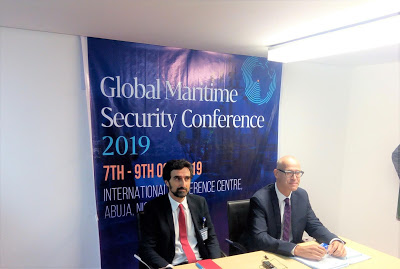 |
| Mr. Oliver Stolpe(Right) and Mr. Giuseppe Sernia
|
The United Nations Office for Drugs and Crime
(UNODC) has scored Nigeria high on efforts and collaborations to tackle
maritime insecurity and smuggling of hard drugs in the Gulf of Guinea.
UNODC
also applauded Nigeria for enacting a distinct anti-piracy law to broadly
confront the problem of piracy and crimes on the country’s territorial waters
and exclusive economic zone.
for Nigeria, Mr. Oliver Stolpe, stated these during a press conference on
Tuesday in Abuja on the second day of the ongoing Global Maritime Security
Conference.
Offences Act 2019 was enacted on June 24, 2019 after an assent by President
Muhammadu Buhari, making Nigeria the first country in West and Central Africa
to have a standalone antipiracy law.
Safety Agency (NIMASA) facilitated the drafting of the Suppression of Piracy
and other Maritime Offences Bill in 2012, in collaboration with the
International Maritime Organisation (IMO).
things that have been done right, that is the Suppression of Piracy Act that
was passed by the Nigerian government, which for the first time gives a
comprehensive framework to tackle the issue of piracy and, more broadly,
maritime crimes. We are on a good path.
which is the prosecutions.”
attempt to deal with insecurity in the Gulf of Guinea.
alongside the Programme Officer at the UNODC Office in Nigeria, Mr. Giuseppe
Sernia, said one of the major challenges in the Gulf of Guinea was the
“extremely fragmented” nature of the legal framework regulating the maritime
domain.
frameworks in place, gaps existed in terms of the countries signing on to the
conventions and actually putting them into domestic legislation and
policies.
for trafficking in hard drugs, especially cocaine, by sea, with huge seizures
recently in Cape Verde, where almost 10 tons of cocaine were seized, Guinea
Bissau, and other countries.
Nations Convention Against Illicit Traffic in Narcotic Drugs and Psychotropic
Substances.
